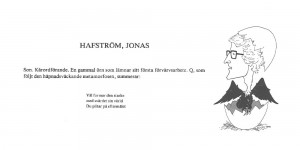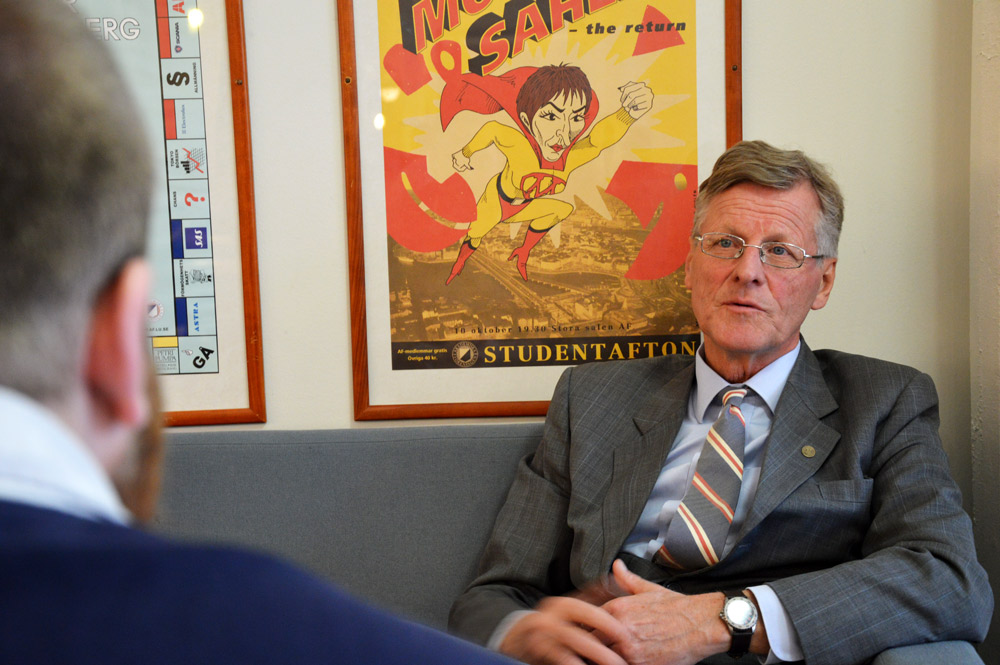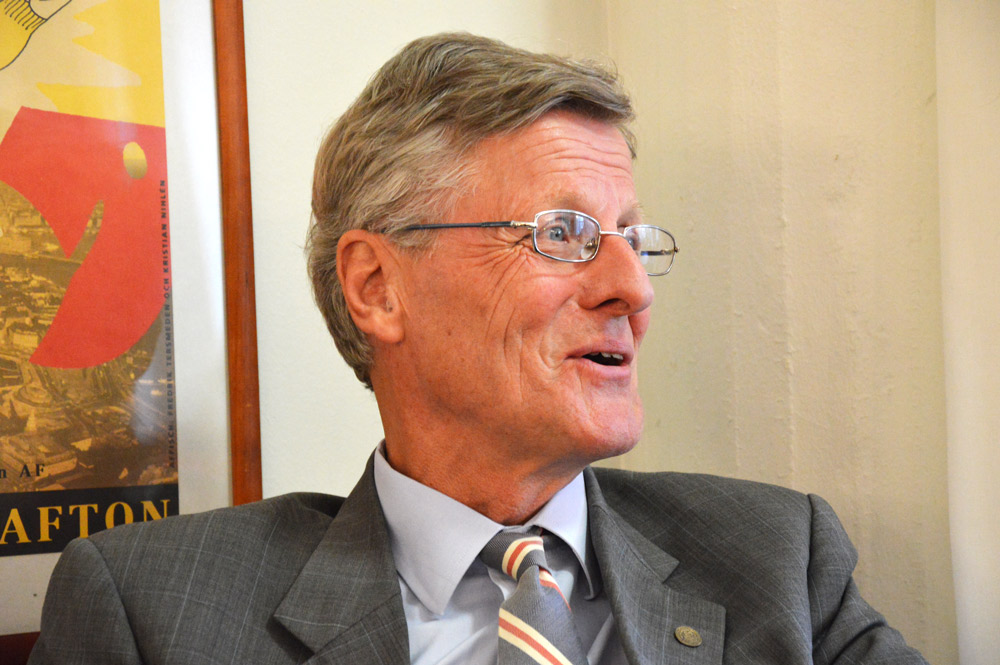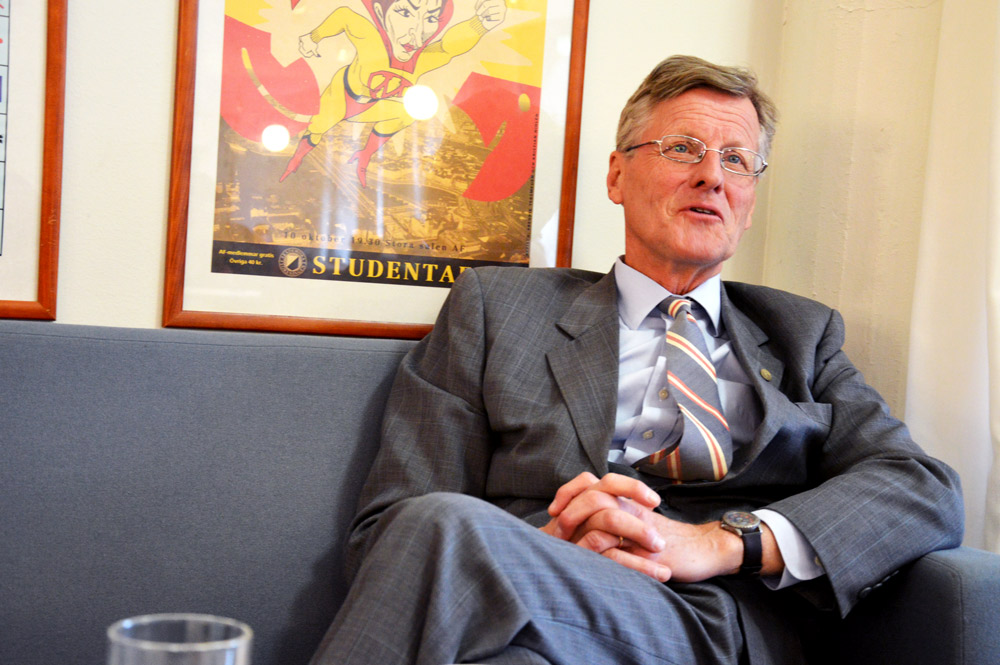The Washington DC diplomatic area has been exchanged for the outskirts of Åstorp. Jonas Hafström is finally home. As the new chairperson of the University Board at Lund University, he wants to give back to that which has given him everything.
“Oh, you seem to have dropped something”, Jonas Hafström says cheerfully and bends down to pick up a coin underneath the counter at Café Athen. The girl in front of us in the coffee-line smiles.
“Thank you”, she says.
“No problem!” he answers joyfully and turns to me.
“What would you like? Feel like having a pastry? One of those?” Jonas asks and points at a cake that costs 24 Swedish crowns.
“Coffee is fine”, I answer.
“Are you sure?” Jonas says, sounding almost a bit offended.
“Yes, it’s ok.”
“Alright! Next time, then.”
Since the first of March, Jonas Hafström is the new chairperson of the University Board at Lund University. As the son of a professor, he has thrived in the academic surroundings of Lund, and grown up to be a praised diplomat.
During the Bildt-administration in the 1990s, Jonas Hafström worked as the Foreign Policy Advisor and Assistant Under-Secretary. Despite that, he flinches a little when I ask who he votes for – maybe because it is such an obvious question. He throws a quick glance at his press secretary who is joining us for the interview.
“I’ve always voted for Nya Moderaterna”, Jonas Hafström answers.
After many years of assignments relating to domestic politics, Jonas Hafström was stationed in Bangkok as the Swedish Ambassador, in 2004. It was the same year that would teach the whole world what a tsunami is.
The diplomatic work he did during the tsunami disaster in the Christmas of 2004 came to be a great asset for Sweden, and he was later awarded the H. M. the King’s Medal of the 8th size, suspended by the Order of the Seraphim ribbon, for his work.
“The most important task of any diplomat is to help his or her citizens who are in need. This task was greatly put to the test during the tsunami. We Swedes are very good at that kind of work and we had a great team down there”, Jonas Hafström explains.
However, not everyone agreed. Jonas Hafström received harsh criticism from, among others, the eternal columnist at the newspaper Expressen, Lars Lindström, in connection with the medal ceremony.
But the criticism did not stick and during 2007, Jonas Hafström became the Swedish Ambassador in Washington DC. He then returned to Sweden again in 2013.
Today, he is retired and lives outside of Åstorp in Skåne, although he is still registered as living in Stockholm.
“It takes me about 50 minutes to get to work. It’s so nice to just get in the car and blast off down the E6. I’ve got a Volvo XC60, it’s so much fun to drive. You sit quite high up, you know, and then you just cruise along the road”, he laughs.
“But don’t write that!”
He lives together with his wife and dog. Two of his three children study at Lund University.
The University is deeply rooted in his family history. Jonas’ father, Gerard Hafström, started working at the University as a Professor of Legal History when Jonas was 8 years old. He moved to Lund and did not leave for the next 20 years.
“I have a Bachelor degree in Law from the University”, Jonas Hafström says.
How involved were you in the student life?
“I’d say that I was quite involved”, he laughs.
“It all started when I was the chairperson of Lunds Akademiska Officersällskap (LAOS) – it was one of the oldest student associations in the country that dealt with spreading information about security and defence issues. I was also Master of Ceremonies at the University.”
“And then there was the Student Union politics, of course. I was the Chairman of Fria Studenter (FRIS). I remember the election for President of the Students’ Union in 1975. Femvak ran in that election, they wanted to become their own Student Union. We formed a coalition together. They didn’t become their own student union until ten years later and I supported them then.”
It was all about politics already? (The question was intended to be about him personally, but he took it to mean all the students in Lund.)
“It was a lot more about politics back then. I mean, there were political parties both right and left back then.”
How do you remember your time as a student?
“Like an immense freedom. You didn’t know what was going to happen during the day. It was a challenge, you had to find your own pace. That was not a given for me.”
Caption: Jonas Hafström in Lundagård edition 9/1974
What were you like as a student?
“I got through my education at least”, he says.
He actually got two passing grades, six passing grades not without honours and six passing grades with honours. Once again, he steers the conversation towards the student life.
“The difference between now and then is that, now, there’s more of a campus-feel to it. Before, you would study at home. The study environment that exists today is so enriching with all the buildings, the mix of people and discussions”, Jonas Hafström says, a bit dreamingly.
When were you last at a sittning?
“Well you see, it wasn’t that long ago at all!”
Unexpected.
“It was at Studentafton in 2011 or 2012. It was me and Per T Olsson from Sydsvenskan, talking about the US. We were in Lilla salen and then, we continued on to Nya Festsalen.”
Do you have a favourite drinking song?
“Hmm, that has to be Så bister, kall sveper nordanvinden. You don’t know that one, do you?” Jonas Hafström says.
“No, sorry”, I answer.
“The boring part about it is that it is actually a sobriety song. My father didn’t think you should sing those”, he says.
Before I have time to ask a follow-up question, Jonas starts singing.
“Så bister, kall sveper nordanvinden om stugknuten den sena kväll. I stugan sitter så blek om kinden en liten flicka vid spisens häll”, Jonas Hafström recites the lyrics in a rap-like way.
“Den bleka hyn och de tärda dragen de vittna tydligt om sjukdom, nöd, och hennes pappa har hela dagen för krogen glömt skaffa barnen bröd”, he sings. It looks like he wants to keep going but stops himself after the first verse.
“And then a Schnapps. You can of course discuss how appropriate this is, but it’s what we sang back when I was a student.”
Do you miss that life?
“Yes, I’d have to say I do. I tell my children to not rush through their studies. Don’t rush! You only get to be part of the student life once. That freedom, that chance to study whatever you want, and, most of all, make friends. I still have that camaraderie that you get from studying together with my old friends from Lund. We fought for what we thought was right. You form a special bond”, Jonas Hafström says and continues:
“This is not very politically correct but: Take a year extra for your studies. You’ll get to the labour market eventually, and then you might ask yourself why you didn’t stay an extra year at the university.”
Jonas Hafström is taking over as the chairperson of the University Board from the current Minister of Foreign Affairs, Margot Wallström. With Margot Wallström, the students got used to having a relatively absent Chair of the University Board who often was just a name on the University’s website and nothing more.
To Jonas Hafström, the post seems to have great sentimental value instead, and he seems reluctant to change anything.
“The offer to become chairperson of the University Board came as a big surprise. I think it’s great that I am able to give back to Lund University for my time as a student here. It was formative years, and they shaped me to who I am.”
“Before I took up the post, I sat down with Margot Wallström. We talked about Lund. She had a little motto: ‘For the students, only the best’. She told me that I was very welcome to use it, and I’d love to. The saying sounds better in Latin, but I’m not one of the ones who speak Latin. It sums up the focus for the chairmanshipposition. Now, I get to give back for my time as a student.”

How close to the students will you work?
“As the chairperson of the University Board, you want what’s best for Lund University, but as an old chairperson of the Student Body, I obviously have a lot of love for students and student involvement. Of course, I’ll fight for the students.”
Basically, what is your roll?
“To set the agenda. To decide what gets discussed during meetings. It sounds like I have all the power, but that’s not the case. There are already a few things that have to be dealt with. There’s the budget, planning activities and following up previous decisions. Moreover, the Board might take an initiative and start discussions. The Board has influence over every part of Lund University.”
What is the agenda you want to set?
“We live in a globalised world – and it’s the world we will keep living in. This asks a lot of Sweden. We need to continue to excel in the important markets. If we have a country with a large production of both goods and services, we also need to have a highly qualified workforce.
“That’s why I believe that it is crucial that the coming generations get a higher education. Otherwise we won’t stay at the top.”
More and more people want to study, but there are less and less places. What are your thoughts on that?
“It’s interesting. First and foremost, education must be free. Then there is the issue of dividing the money between research and undergraduate studies. We already take in more students than we receive money for, and that weakens our undergraduate studies. It’s a very important issue.”
“It’s a question of how to bridge the gap between research and undergraduate studies within financing. It’s a complicated system, but if all of Sweden’s Higher Education System speaks as one, the government would have to listen”, Jonas Hafström says.
He has barely touched his coffee, which by now must have gone cold. After answering a question, Jonas Hafström leans back with his arms folded, only to lean forward again a second later, to answer the next one.
The press secretary is by now starting to zone out and takes out her phone more and more frequently. However, Jonas Hafström’s enthusiasm for talking about Lund University does not fade.
Lund University once again ended up outside the list of the 100 best universities. Could this get Lund on the list?
“I’ve come to understand that there is more than one list. It depends a bit on which one you’re looking at. On two of them it’s between 100-150 and on one it’s 60. 60th place among 17,000 universities all over the world. That’s not bad at all. You have to agree – that’s absolutely fantastic. We have to stay international, and I think there is every chance for that.”
“The research labs Max IV and ESS have put Lund on the map, and they will continue to do so in ways that I think we don’t really realise yet.”
How do you mean?
“An example: a delegation for Nordic industry, with representatives from all the greatest Nordic companies, was at a convention at Stanford University in the US recently. There, the President of Stanford not only praised Sweden, but he highlighted Lund University. Maybe we shouldn’t make it into a bigger deal than it is, but still. Americans were visiting Max IV and said that such a building won’t exist in The US for another five or six years. Here, we have a great opportunity to attract foreign scientists and create a science cluster.”
Will there be any challenges for the University in the coming years?
“There’s the issue of gender equality in the higher levels within the University. In some faculties, the progress is even going the wrong way. We have to get better and the only way to do so is to work at it. It’s a big challenge.”
“Another big challenge is to have a great range of students that come here. It’s very important. It shouldn’t matter where you come from or if your parents are academic – it should be a natural choice to begin your studies to eventually get an exciting job in the future. Either in Sweden, Europe or somewhere else in the world.”
What do you think of international collaboration? Are there some you view as not okay?
“There are governments in the world that opinions differ on, but the citizens should not suffer because of it. The students should not suffer because of it. We should all be welcoming to the students.”
“If there are students from countries or regimes that have a different view on democracy, human rights and equality than we do, then, of course, we can influence them. Because of that, I think we should welcome them and continue with the work we’ve been doing for a long time.”
“Ten years ago, the largest group of students came from Pakistan. They come from a country with different values and I hope that some of them brought some of our values with them when they went back.”
So Lund University could be a promoter of human rights?
“Absolutely! I have no doubts about that.”
But do you think that the students who come here should have to pay?
“This was a decision made by the previous government. The money saved was going to taking care of refugees. Now, they intend to collect 100 million Swedish crowns for a scholarship fund for students coming to Sweden from other countries. Give them a hefty sum of money, not just for the fees but for living here while studying. A better gift is hard to imagine.”
Five years ahead: Where is Lund University in 2020?
“I think Lund University will keep being one of the top 100 universities in the world. I’ve seen the great power that exists here. The will to be at the top runs through everyone you talk to. No one I’ve talked to says they don’t want to be at the top. Everyone will do their best to keep us there”, says Jonas Hafström.
He looks pleased, happy with his life. He seems to be home.
So, what now? I ask as a final question.
“Haha, who knows? I think we have a meeting after noon, so maybe some lunch?” he asks, hinting at his press secretary. It’s 10.42 am.
I turn off my dictaphone and close my notebook. We shake hands and start moving towards the door of Café Athen. As we part, I remember that I forgot one question.
“Hey! How often will you be in Lund?”
“Oh, I’ll be around”, says Jonas Hafström.
Good, I think to myself. Then maybe I can get that cake some other time.
Facts about Jonas Hafström
Sven Jonas Gerhardsson Hafström
- Born: Friday 27 of February 1948.
- Family: Wife Eva Hafström, among other things, one of Queen Silvia’s former lady-in-waiting, three children and a dog.
- Lives: Wrams-Gunnartorpsvägen 7, Billesholm. Written at Frejgatan 14 lgh 1301, 113 49 Stockholm.
- Education: Law clerk and educated at the trainee program at The Ministry of Foreign Affairs.
- Number of ECTS-points (högskolepoäng) at Lund University: 270 higher education credits (180 academic credits in the old system).
- Former student engagements: Chairman of Lunds Akademiska Officersällskap, Chairman of Fria Studenter (FRIS) and Master of Ceremonies at the University.
- Does now: Retired and chairperson of the University Board at Lund University.
- Taxed income 2012: 1 169 000 Swedish crowns.
- Taxed income 2013: 1 171 000 Swedish crowns.
- Current salary: Pension and around 60 000 Swedish crowns per year from the University.
- Motto as chairperson of the University Board: For the students, only the best.
- Most proud of during his career: The Swedish diplomatic work during the tsunami.
- Corporate engagements: None.
- On the question if he has a criminal record: ”I probably do. There is probably no one who hasn’t done something stupid and then realised that he shouldn’t have. Whatever that could have been…”
- Is reading: Kalle Kniivilä’s Krim tillhör oss: imperiets återkomst.
- Twitter: @SwedinUS. Although he is inactive. Two favourited tweets: Both from his more active friend, Carl Bildt.
- Instagram: No.
- Hobbies: He describes himself as an outdoorsy person. Jogs and plays tennis.
Text: Casper Danielsson
Photo: Najla Vallander
Translation: Emily Eriksson








